- Fearless house cat has close-up encounter with mountain lion
- Police officer sings to child ejected in deadly car accident
- Doctors and staff trash sedated patient during colonoscopy in shocking audio
- Sting operation catches Whole Foods overcharging customers
- Cops got Burger King meal for Charleston shooting suspect after arrest
The Supreme Court has ruled in favor of the government when it comes to the issue of Affordable Care Act subsidies.
The 6-3 decision means subsidies will be available to any person buying health insurance on an exchange, whether it is run by a state or the federal government.
According to the Associated Press, the justices said in a 6-3 ruling that the subsidies that 8.7 million people currently receive to make insurance affordable do not depend on where they live, under the 2010 health care law.
>>More on Supreme Court's health care decision
This is a developing story, return for updates. Continue reading for more background on the case.
The Affordable Care Act is once again under scrutiny by the U.S. Supreme Court, this time for the law’s establishment of subsidies and exchanges.
In King v. Burwell, the justices will decide the importance of four key words in the landmark piece of legislation which is designed to make health insurance more affordable. While the individual mandate was deemed constitutional by the Supreme Court in 2012, the current case up for review focuses on the availability of subsidies.
The plaintiffs argue that the ACA says that subsidies are available only to people who purchase health insurance on an exchange “established by the state.”
According to the plaintiffs, for the approximately 7 million Americans who live in one of the 34 states without a state-run exchange, the federal government operates the exchange. Because the federal government is not a state, by law, the subsidies are not available to those people.
The federal government argues that the ACA was written to provide subsidies to anyone who purchases health insurance on an exchange, whether it is run by a state or by the federal government.
The decision could significantly disrupt the health care system.
If the justices side with the plaintiffs, several million people could lose their subsidies, making it more difficult for them to afford health insurance. The insurance rates in states without state-run exchanges could rise. If the justices side with the federal government, subsidies should remain available to people purchasing health insurance from any state or federal government exchange.
The King v. Burwell ruling is not expected to affect those states that operate their own exchanges.
For more on the case, visit SCOTUSblog.
The Latest
Featured


